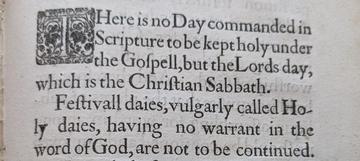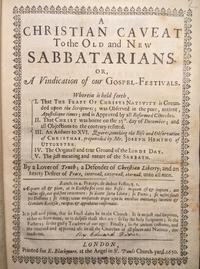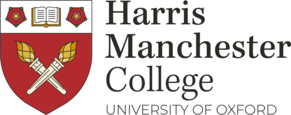Historical Tracts and the story of Christmas
Historical Tracts and the story of Christmas
The College Library has an outstanding collection of Tracts within the archive. The collection contains over 11,000 tracts bound chronologically in 900 volumes. Our earliest tract dates from 1589. As tracts tended to be pamphlets and insubstantial many haven’t survived over the years so some of the titles in our collection are the only UK copy or the only reported copy available.
The Oxford Dictionary of the Christian Church defines a tracts as ‘a pamphlet, usually issued with a religious or moral purpose’. Tracts are often concerned with promoting a particular viewpoint or position and the religious upheavals of the 17th and 18th centuries saw a substantial number of items being published. In many cases a tract was published and then a response to that idea was published and so on. As a result, our collection has arguments and counter arguments in the same volume. Our collection strength is in Nonconformist and Unitarian publications.
Taking just a couple of tracts from our collection, one can trace how in the centuries following the Reformation the status of Christmas Day was contested and debated at length. For many reformed and dissenting Protestants, Christmas encouraged immoral behaviour, was associated with popish rituals and had a distinct pagan flavour. Dissenters focused their worship on Sunday services rather than the cycle of festival days that had previously marked the liturgical year (of which Christmas was a part).

During the Civil War and Commonwealth, legislation was introduced by Parliament that severely limited Christmas festivities. In January 1645, Parliament produced a new Directory for Public Worship (T: 808/8) that stated that festival days (including Christmas) were not to be celebrated – “There is no Day commanded in Scripture to be kept holy under the Gospell, but the Lords Day, which is the Christian Sabbath. Festival days, vulgarly called Holy days, having no warrant in the word of God, are not to be continued.”

There are various tracts within the collection that strongly argue in favour of Christmas and are against the Puritan view that it has no basis in the scriptures. Edward Fisher published one such tract in 1650 with the title ‘ A Christian Caveat to the Old and New Sabbatarians. Or, A Vindication of Our Gospel-festivals. : Wherein Is Held Forth, I. That the Feast of Christs Nativity Is Grounded upon the Scriptures; Was Observed in the Pure, Antient, Apostolique Times; and Is Approved by All Reformed Churches. II. That Christ Was Born on the 25th. Day of December; and All Objections to the Contrary-refuted....’
Later tracts such as Joshua Toulmin’s published in 1770 and Israel Worsley’s in 1820 showed that even with Christmas reinstated, following the Restoration, there continued to be objections to people observing Christmas as a day of festival and concern with the dissolute celebrations associated with it. Joshua Toulmin’s sermon, preached on Christmas Day 1770, clearly demonstrates his view that festival days were not beneficial for the community and impeded the effectiveness of the increasingly industrialised workforce. In his sermon he preached against the observation of holy days, citing their impact on Industry saying that ‘every day [holy days] is an Incentive to personal Vice, and a loss to the civil Community’. Celebrating such days encourages ‘habits of idleness and debauchery.’ Worsley’s sermon, even in the nineteenth-century, associated Christmas with heathen and pagan superstitions.
Victorian respectability and the focus on the domestic led to the celebrations changing in character. Christmas became about being at home with family as well as an increased emphasis on charity and good works. This change in focus can be traced in newspapers and journals of the 19th century. Christian Life and The Inquirer, two Unitarian newspapers we have in the archive, demonstrate the development of the Christmas idea. Early editions of the titles barely mention Christmas but by the end of the century there are columns wishing readers Merry Christmas and celebrating the day’s festivities. In the December 23, 1876, edition of Christian Life, an article entitle Christmas Day says ‘For Christmas Day, the Day of the World’s Child, and the World’s Home, is pre-eminently the Children’s Day. It’s the Day of the gatherings of families, when households, which the work of business and work of the world have held apart, are bought together..’ It goes on to describe Christmas Day as ‘the Day of home affection’, ‘The Day of neighbourly good-will’ and ‘The Day of social charity.’ The transformation of debauched celebrations into a time for charity and families was complete.
Tracts cited
Tyler, Evan, Alexander Fifield, Ralph Smith, and John Field. A Directory for the Publique Vvorship of God, throughout the Three Kingdoms of England, Scotland, and Ireland. : Together with an Ordinance of Parliament for the Taking Away of the Book of Common-prayer: And for Establishing and Observing of This Present Directory throughout the Kingdom of England, and Dominion of Wales. Die Jovis, 13. Martii, 1644. London:, 1645. Print. T:808/8
Fisher, Edward, and Edward Blackmore. A Christian Caveat to the Old and New Sabbatarians. Or, A Vindication of Our Gospel-festivals. : Wherein Is Held Forth, I. That the Feast of Christs Nativity Is Grounded upon the Scriptures; Was Observed in the Pure, Antient, Apostolique Times; and Is Approved by All Reformed Churches. II. That Christ Was Born on the 25th. Day of December; and All Objections to the Contrary-refuted. III. An Answer to XVI. Quæres, Touching the Rise and Observation of Christmas, Propounded by Mr. Joseph Heming of Uttoxeter. IV. The Originall and True Ground of the Lords Day. V. The Just Meaning and Nature of the Sabbath. London: Printed for E. Blackmore, at the Angel in St. Pauls Church-yard., 1650. Print.
Toulmin, Joshua, William Pine, J. Buncombe, W. Brown, James Buckland, and R. Baldwin. The Observation of Festivals and Holy-days, Considered, : In a Sermon Preached at Taunton, on Christmas-Day, 1770. Bristol: Printed by W. Pine, in Wine-Street. Sold by J. Buncombe, in Taunton; W. Brown, in Honiton; and J. Buckland, and R. Baldwin, in Pater-noster-Row, London., 1771. Print. T:372/2
Worsley, Israel, John Commins, Rowland Hunter, and David Eaton. An Enquiry into the Origin of Christmas-Day: : Shewing That This and the Other Festivals of the Christian Church Are Continuations of the Heathen Feasts of Antiquity. Together with the Remarks on the Celebrated Number Three, Which Has Been Made Sacred by Pagan Superstition. Plymouth:: Printed and Sold, for the Author, by John Commins. Sold Also in London, by R. Hunter and D. Eaton., 1820. Print.



